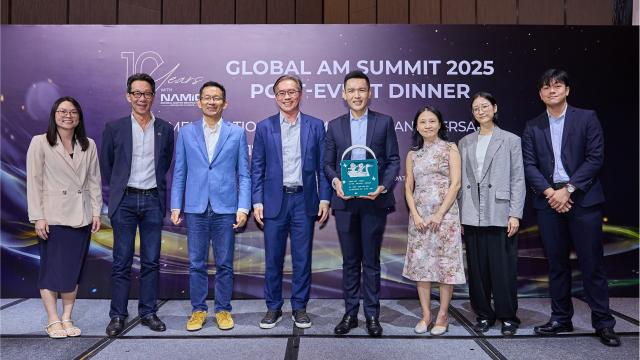From equipment to expertise, FoodPlant provides the ''ingredients'' that local food manufacturers need to innovate and scale their businesses. The people behind Fish Soup Paradise and Sustyfoods spill the beans on their experience.
When the COVID-19 pandemic hit, Mr Jerry Wu, owner of Fish Soup Paradise, was forced to close shop. Soon, his loyal customers began ringing him up while they were cooped up at home during the circuit breaker, hungry for a taste of his family recipe.
From serving piping-hot bowls of fish soup, he made the switch to freezing his stock and delivering it to customers.
Two years in, he realised this arrangement was unsustainable. Not only did his packaged soup have a short shelf life of six months, but customers also complained that it took up too much space in the freezer as it came in blocks.
While these could easily be solved by specialised food production equipment, such machines cost over $0.5 million each on average, a price that the fledgling business which started in 2019 clearly could not afford.
Thankfully, he found a solution as he was idly flipping through the newspapers one day. FoodPlant, Singapore’s first shared facility for small-batch food production, was officially opened in April 2022 by the Singapore Institute of Technology, Enterprise Singapore and JTC.
Equipped with a full range of pilot-scale equipment, including a retort machine that could extend the shelf life of food through commercial sterilisation via retort technology, FoodPlant was too good an opportunity to pass up. Through their newfound partnership, Fish Soup Paradise’s packed soup eventually evolved from frozen blocks to concentrate pouches, with an extended shelf life of one year.
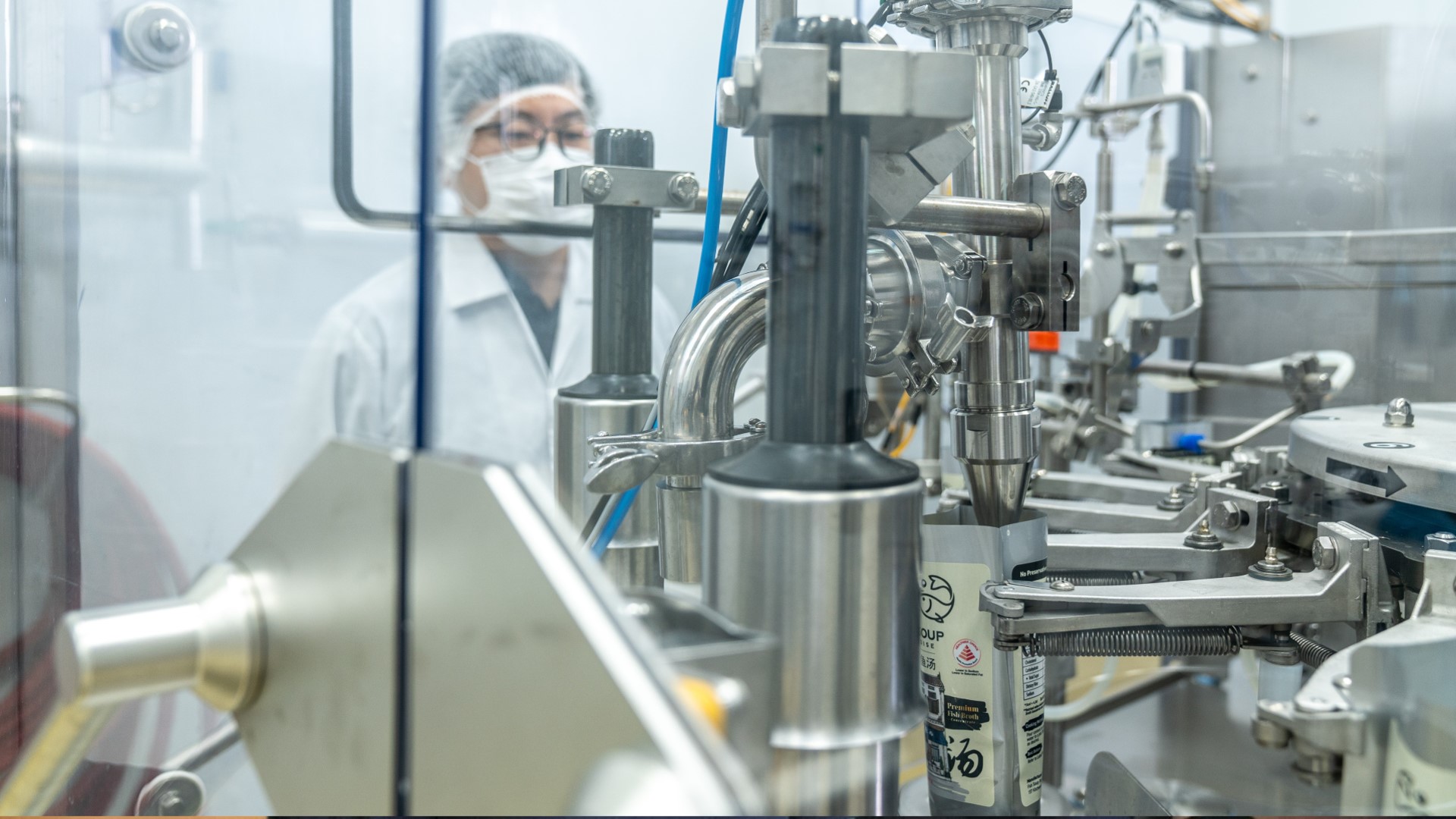
Mr Jerry Wu, the owner of Fish Soup Paradise, looks on as his fish soup broth product is packaged in the Filling and Packing room of FoodPlant. (SIT Photo: Keng Photography/Tan Eng Keng)
“FoodPlant was critical for my business to move forward. Without them, I probably can only maintain Fish Soup Paradise as a restaurant business,” Mr Wu said.
Fish Soup Paradise: Teach a Man to Fish
Initially, Fish Soup Paradise was like a fish out of water when it came to operating large-scale industrial equipment. But with the help provided by the resident experts in FoodPlant, Mr Wu quickly learned about the intricacies of food science.
Essentially, retort machines use high heat to sterilise food after packing to eliminate microorganisms in the packs to achieve commercial sterility. But the set parameters for heat could also potentially alter the taste of a product, so a lot of experimentation was needed to ensure that the soup tasted consistent, whether it came from a packet or straight from the restaurant kitchen.
After six months of trials, the team finally hit the sweet spot. Their new shelf-stable soup pouches would retain both their nutritional value and, most importantly, the familiar taste they were known for. They could also now be stored at ambient temperatures, ready to be heated up for consumption.
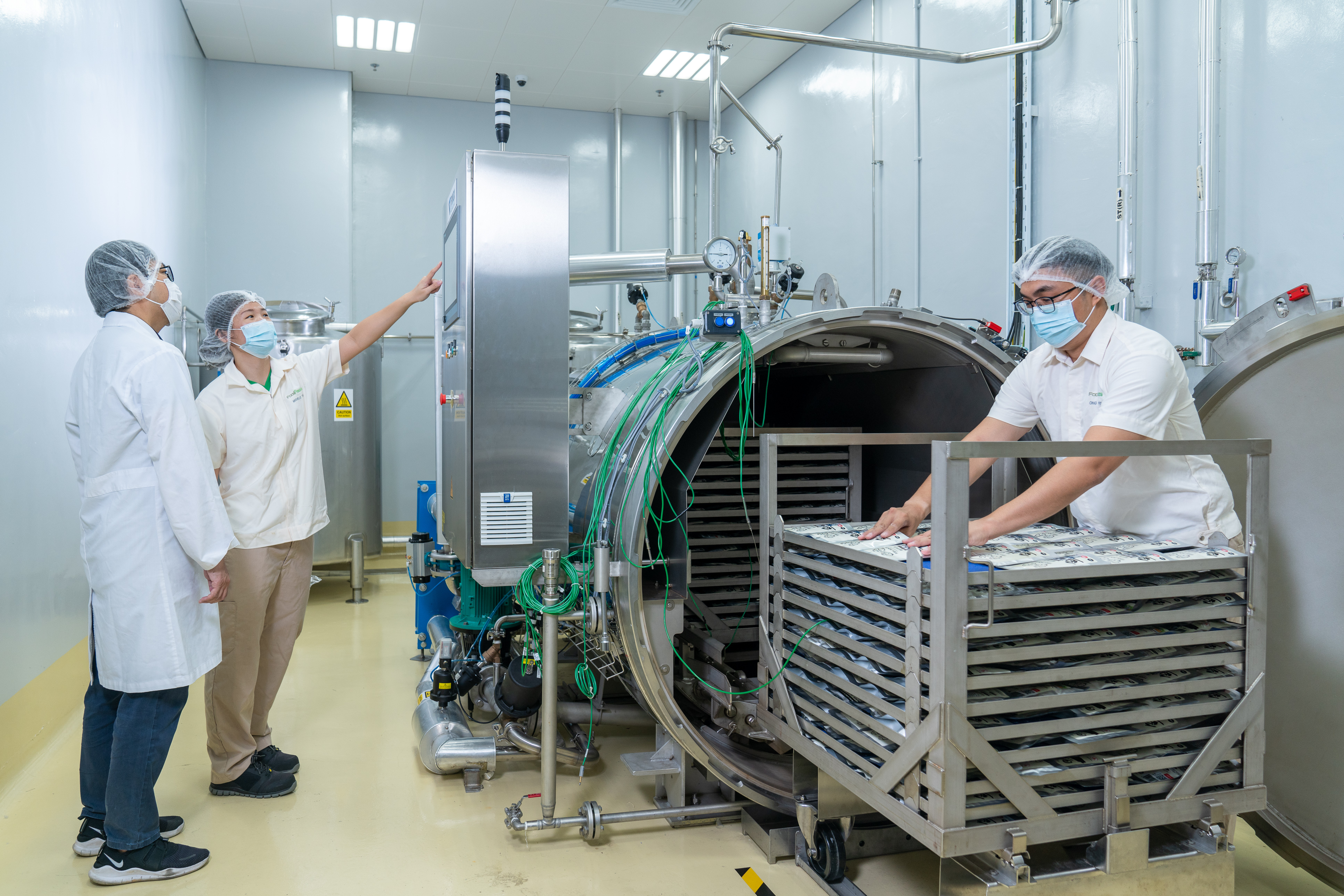
Fish soup broth products being prepped for retort processing via the retort machine. Jerry Wu (left) is assisted by FoodPlant staff Michelle Tan (second from left) and Ong Wai Peng (right). (SIT Photo: Keng Photography/Tan Eng Keng)
“The cooking time, the retort time, the right recipe – there are a lot of parameters (to consider) during the food manufacturing process. So, the fun part is when you get everything correct,” Mr Wu shared.
Since January this year, more than 10,000 packs of soup, priced from $5.80 each, have been sold. There are over 10 flavours, ranging from the signature fish broth to Teochew bak kut teh and tom yum fish broth. By July, his new food factory will be fully operational.
“With my food factory, I’m now a food manufacturer. This allows me to develop better products and contribute to the food industry,” he added.
Indeed, Fish Soup Paradise is conducting ongoing trials with FoodPlant to explore upcycling of their food side streams to create premium baby food as well as instant porridge with a healthier twist.
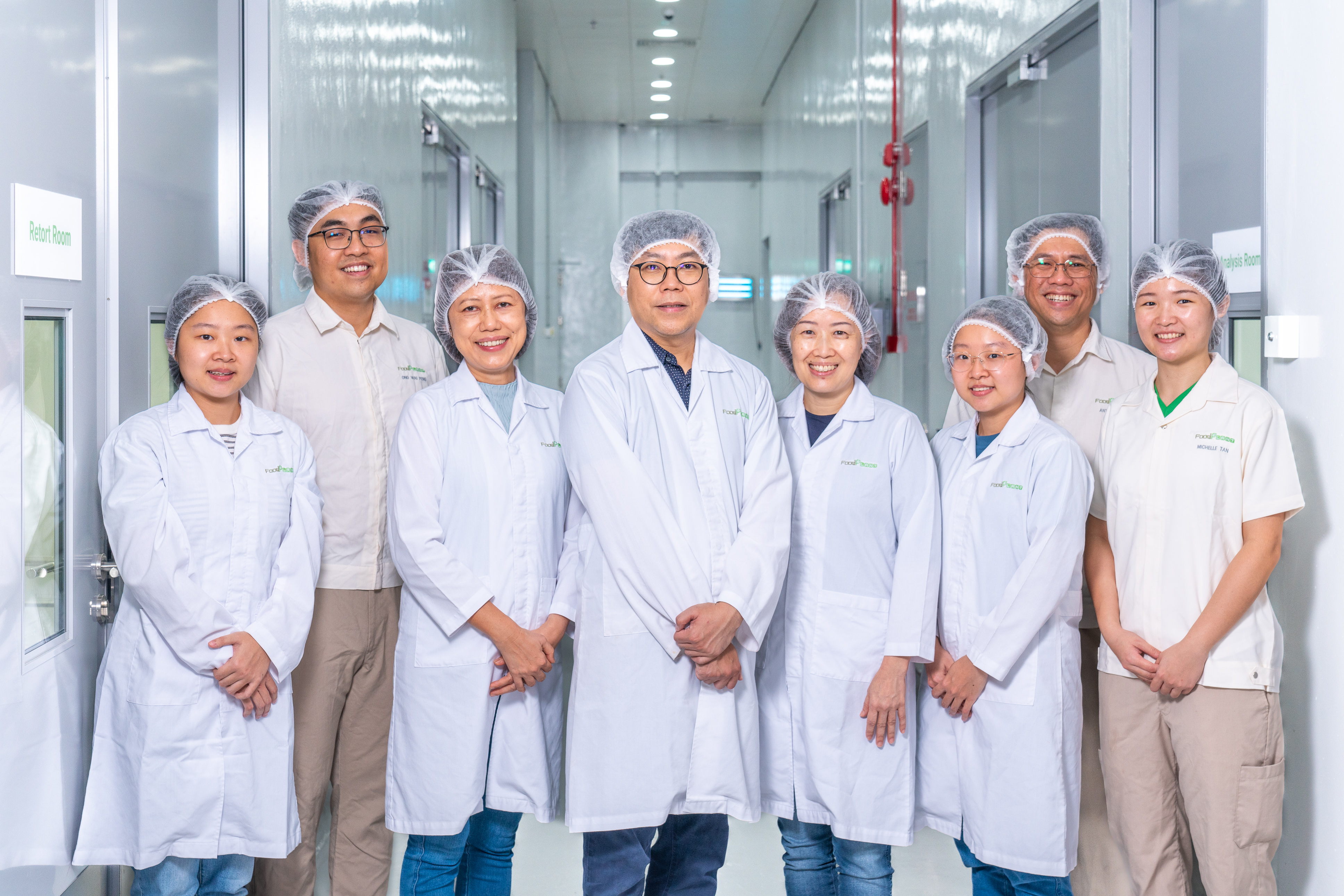
Mr Jerry Wu (fourth from left) and the FoodPlant team. (From left to right): Angeline Goh, Ong Wai Peng, A/Prof Lim Bee Gim, CEO of FoodPlant; Mr Jerry Wu, Fiona Lee, Angela Goh, Anton Thai and Michelle Tan. (SIT Photo: Keng Photography/Tan Eng Keng)
Sustyfoods: Sustenance Made Sustainable
Similarly, Sustyfoods, a direct-to-consumer brand selling healthy, calorie-controlled food products online, managed to lower its costs of production by about 30% by partnering with FoodPlant.
“You can’t run food production like a sweatshop in Singapore,” said Mr Gautam Param, co-founder of Sustyfoods, which started in 2017. The Twin Screw Extruder at FoodPlant can produce 1,000 units of their signature food product in just an hour. This brings about economies of scale to their business.
Besides affordable access to small-batch commercial-scale equipment, Sustyfoods also benefitted from FoodPlant’s research and development consultancy services.
While the production aspect of their business was previously a “black box” since it was outsourced to co-manufacturers, Mr Gautam now sees his team as semi-experts in the production process from start to end, a “necessary jump” for the brand to move forward.
“What we’ve learnt over the years is that when you don’t have full control or knowledge of the production process, you build all right products, but not excellent products,” he said.
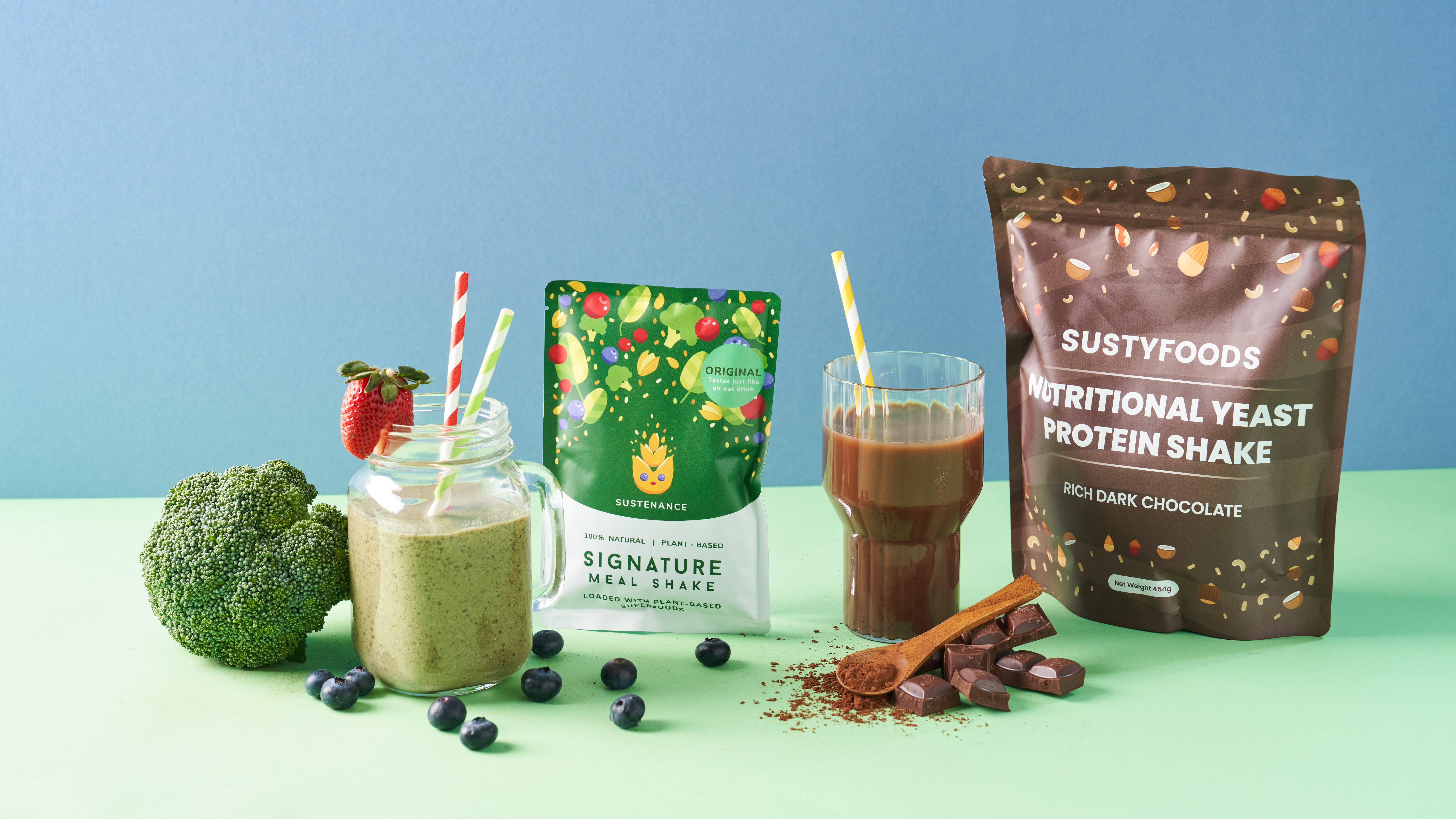
Sustyfoods sells healthy snacks and beverages to online consumers. (Photo: Sustyfoods)
Ultimately, their long-term goal is to continually improve on the sub-components of production. For example, while people typically use sugar or oil as adhesives to stick seeds or sprinkles on snacks, which add unnecessary calories, Sustyfoods is exploring lower-calorie options like fibre-based liquids.
“We can always do better for a single product, based on what the market is asking for but is not getting,” he said.
These innovations are baby steps towards Singapore’s “30 by 30” goal, which aims to boost local food production capabilities so that the country can sustainably produce 30 per cent of its nutritional needs by 2030.
“FoodPlant has facilitated innovation and collaboration in the food manufacturing industry by providing affordable access to a wide range of pilot scale equipment, as well as providing food companies access to industry expertise. By providing a shared production facility, we empower companies to create and test innovative food products without the burden of high costs and excessive risk. FoodPlant enables entrepreneurs to explore, refine, and commercialise their ideas, ultimately driving forward the sustainable food landscape in Singapore,” said FoodPlant CEO, Associate Professor Lim Bee Gim.















![[FA] SIT One SITizen Alumni Initiative_Web banner_1244px x 688px.jpg](/openhouse2025/centre-professional-communication/sit-teaching-and-learning-academy/openhouse/directory/sites/default/files/2024-12/%5BFA%5D%20%20SIT%20One%20SITizen%20Alumni%20Initiative_Web%20banner_1244px%20x%20688px.jpg)


